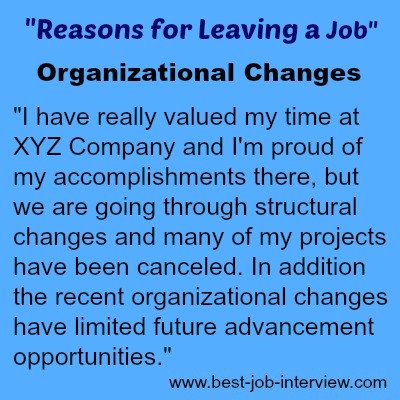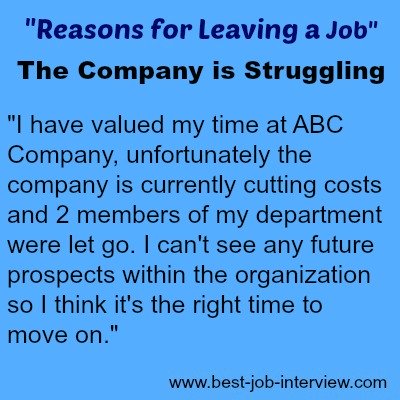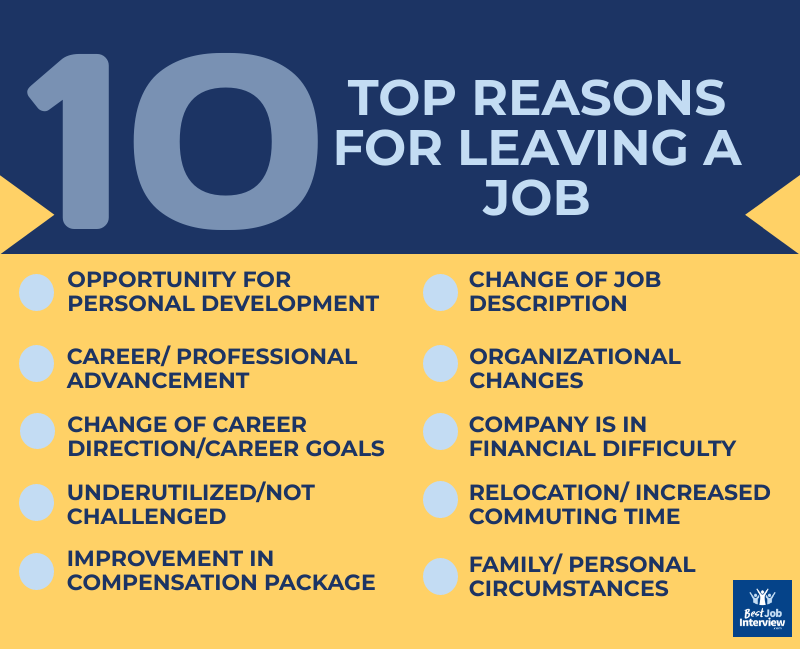- Home
- Job Interview Questions
- Reasons for Leaving a Job
The Right Reasons for
Leaving a Job
There are a number of rational and acceptable reasons for leaving a job. When you get asked this question "Why are you leaving your job?" in your job interview it is essential to answer confidently - a solid explanation for your resignation helps you to do this.

Your potential employer wants to clearly understand why you are moving on, a legitimate reason for your resignation will set their minds at rest.
Every employer is looking for loyal and responsible employees. It is critical that your explanation for leaving reflects the right work values.
Spend some time thinking about why you want to leave your job and list your reasons in order of importance. This will enable you to present an insightful and sound explanation to any prospective employer.
5 good reasons for leaving a job
1. Professional Growth Opportunity
This is a common and valid reason for making a move and usually includes:
- a more senior position
- increased responsibilities
- more challenging tasks and duties
You can point out how you have mastered your current position and now seek fresh challenges which your current company is not able to provide.
It is important to be specific about what this new job opportunity offers you in terms of new challenges and growth.
2. Change of Career Direction
You have re-evaluated your career goals and decided a change was needed.
Goals change as you gain experience and grow in your job and the company may not be in a position to meet your new career needs. Or you may be leaving your job to move into a new industry or a completely different career.
Be sure to highlight how the job opportunity is a good fit with your career goals and how your job skills can be successfully transferred to this job.
3. Organizational Changes
Is your company going through restructuring or changes such as a merger? In giving your reasons for leaving a job you can focus on the impact these changes have had on:
- your position
- your career plans
- your ability to produce the high standard of work you are accustomed to
4. Your Job Description has Changed
Jobs change or you may land up doing something very different from what you were hired to do. This can be frustrating if it has resulted in your not using the skills and competencies you were hired for, or doing work that you are not interested in.
Avoid sounding negative or playing the victim when giving this reason for your resignation. Focus on why your skills will be of more value to your new employer.
5. The Company is in Economic Difficulties
This is a rational reason for leaving your job. However it is necessary to provide proof such as:
- unpaid salaries
- no increases
- lay-offs
- insufficient resources to do your job
Where there is little hope that a company will improve profitability it is logical to try and find employment elsewhere. Try to avoid sweeping descriptions such as "failing" or "bankrupt" and rather use specifics.
Acceptable personal reasons for leaving a job
1. Family Reasons for Leaving a Job
There are times that people have to leave a job in order to take care of family situations. In your interview answer it is important to reassure the interviewer that these family circumstances have now changed sufficiently for you to be able to focus again on your career.
2. Commuting Time
An overly long commute is an acceptable reason for resigning and seeking employment closer to home. Life-work balance is recognized as essential to employee productivity and
health, however it is advisable to combine this with another reason for your resignation.
"I am looking for a position that is closer to my home and that provides the opportunity to fully utilize my sales skills"
How to explain leaving a job for personal reasons
Leaving a job for personal reasons can be tricky. It is hard to know what to say to your employer or the interviewer and how much detail to provide.
An
employee is under no obligation to provide specifics of their personal
reasons for leaving, it is sufficient to merely state that you are resigning for personal reasons or family reasons. The same applies to your job interview.
However,
depending on your relationship with your manager and the company, you
may want to explain your reasons for leaving more fully. Providing an
explanation will support the relationship, ensure that you leave on good
terms and keep the door open should you wish to return. Likewise, a fuller explanation of your personal reasons for leaving the job when asked in a job interview may be advantageous in preventing any speculation or incorrect assumptions.
There are a number of personal reasons that justify leaving your job, these include:
- family illness
- taking care of children or elderly parents
- change in family circumstances and obligations
- your own health and well being
- change in financial circumstances
Resignation Letter for Personal Reasons
What about salary as a reason for leaving your job?
Employers are well aware that one of the top reasons people leave their jobs is for more pay. A recent survey found that almost 70% of people quit their jobs for a better salary. The question is how to explain this as a reason for leaving your job.
Everyone has financial needs and goals and if your current job or company simply cannot ever meet them it is logical that you want to move to a job where you can reasonably attain the level of salary you seek.
Try to combine this reason for leaving with another so that you don't come
across as only focused on the money. For example:
10 top reasons for leaving a job
These are the top 10 reasons for leaving a job. They are all acceptable motivations for changing jobs and can be expanded on in the job interview.
5 bad reasons for leaving a job
1. Problems with Your Boss or Colleagues
Blaming your manager or co-workers is always a bad explanation. Bad-mouthing your boss or colleagues or discussing office politics casts you in a negative light.
2. Not Liking the Job
This is both wishy-washy and raises red flags about your commitment. Rather focus on why the job is not a good fit for you in terms of your skills and abilities as discussed above.
3. You Did Not Get Promoted
You may have felt you deserved the promotion but the potential employer does not have the objective evidence required to determine that.
4. Unhappy with your Working Conditions
Reasons such as long hours and overtime are to be avoided. Companies want to employ hard-working and dedicated individuals.
5. Unrealistic Job Expectations
This may be the case but again the potential employer has no evidence to fairly determine if the demands on you were too much. Stay clear of complaints about your workload or tough expectations.
Other reasons for leaving a job
Explaining dismissals and layoffs in your job interview can be tough. Find out how handle this with confidence.
You should be able to adequately explain all the career transitions on your
resume. Be prepared to explain your reason for leaving each job and applying for a new job.
Reasons for Leaving a Job Part 2
Reason for leaving your job - what to put on the job application form
When you complete an employment application form you may be asked to list your reasons for leaving your previous jobs.
When filling out a job application form it is important to be transparent and honest as it is likely that the details you provide will be verified with an employment or reference check. However, you will get an opportunity to discuss your reason for leaving more
fully in the interview so there is no need to go into detail on the
application form.
Concise and straightforward reasons for leaving that can be listed on the application form include:
- seeking new challenges
- career-driven move
- career change
- opportunity to progress
- offer of a better opportunity
If you were laid off, you can explain your reason for leaving as:
- organizational changes
- company restructuring
If you left for personal reasons, it is sufficient to simply state:
- personal reasons
- family reasons
- change of personal circumstances
What if you were fired from a previous job? This is tricky and you need to be honest. It is best to be brief and simply write on your job application:
- job ended
- unsuitable fit
- involuntary separation
You will get the opportunity to explain further in your interview.
Sample resignation letters and emails
Be ready for other common job interview questions
Reason for leaving your job is one of the most common job interview questions. Find out how to answer the other top 5 interview questions .













